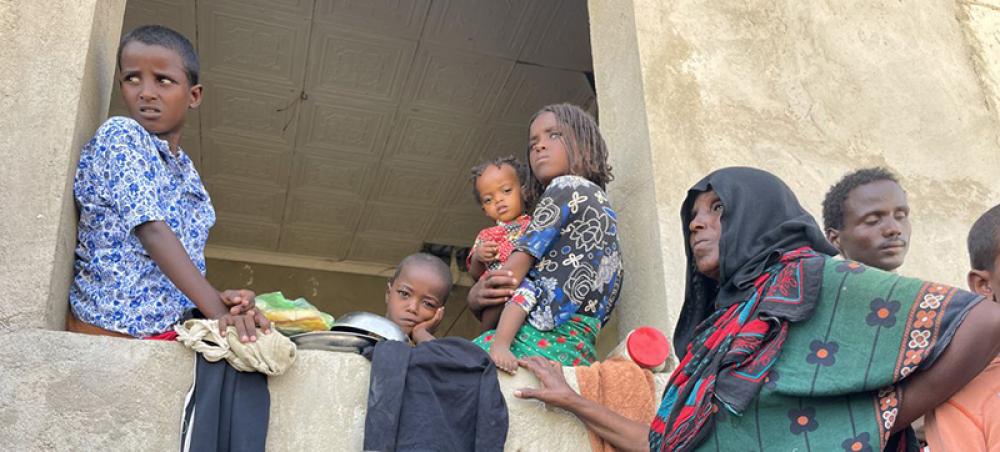Just Earth News | @justearthnews | 23 Sep 2022, 12:25 am Print
 Ethiopia
Ethiopia Image:© WFP/Claire Nevill
New York: Ethiopia’s people are once again “mired…in the intractable and deadly consequences” of conflict between Government troops and forces loyal to Tigrayan separatist fighters, who are all likely responsible for war crimes, top rights investigators said on Thursday.
In their first, extensive report to the Human Rights Council in Geneva, the International Commission of Human Rights Experts on Ethiopia said that they believed that crimes against humanity had also been committed in the on-off war that erupted in the northern region in November 2020.
Worst rights violations
Serious rights violations in Tigray were “ongoing”, the report maintained, noting that fighting resumed last month, breaking a five-month ceasefire.
“Extrajudicial killings, rape, sexual violence, and starvation of the civilian population as a method of warfare” have happened in Ethiopia since the earliest days of the conflict, the Council heard.
Citing information from “credible sources”, Commission chairperson Kaari Betty Murungi – who like the two other members of the panel is an independent UN-appointed rights expert - said that there had been an “escalation” in drone attacks by Government forces that used explosive weapons “with wide area effects in populated areas”, since hostilities resumed.
“Our investigation indicates that their use has exposed civilians to new and heightened risks,” she said. “We have received reports of drone strikes in Tigray in the last four weeks, which have allegedly killed and injured civilians, including children.”
Turning to Tigrayan forces, Ms. Murungi insisted that they had also likely committed serious human rights abuses “which amount to war crimes”.
These included “large-scale killings of Amhara civilians, rape and sexual violence, and widespread looting and destruction of civilian property in Kobo and Chenna in August and September 2021.
“During their searches of homes in Kobo, for example, Tigrayan forces looked for weapons and pulled many men from their homes, executing them, often in front of their families.”
Desperate conditions
Today, international humanitarian access into Tigray continues to be blocked, despite the dire situation there, Ms. Murungi said.
There were reasonable grounds to believe that the Federal Government and its allies “looted and destroyed goods indispensable for the survival of the civilian population in Tigray, killing livestock, destroying food stores, and razing crops while also implementing severe restrictions on humanitarian access to Tigray”, she added, noting that for more than a year, six million people had been denied access to electricity, internet, telecommunications and banking.
This denial and obstruction of access to basic services, food, healthcare and aid relief “amount(ed) to the crimes against humanity of persecution and inhumane acts”, the Commission chairperson insisted.
Starvation ‘tactic’
“We also have reasonable grounds to believe that the Federal Government is committing the war crime of using starvation as a method of warfare,” the top independent rights expert continued, noting that Tigrayan forces had reportedly looted humanitarian aid.
According to the latest dire humanitarian data from the UN Office for the Coordination of Humanitarian Affairs (OCHA), conflict and displacement in northern Ethiopia has left more than nine million people in need in Tigray, Afar and Amhara regions, while severe drought is affecting millions more in the south.
Citing OCHA, Ms. Murungi said that that the combined effect of the Federal government’s measures had left 90 per cent of the population in acute need - an 80 per cent increase since the beginning of the conflict.
“Most of the population in Tigray must now survive on limited and nutritionally inadequate diets,” she said, adding that there had also been “an increase in child marriages and child labour, human trafficking, and transactional sex as desperate means for survival”.
Tigrayan women and girls not spared
According to the Commission chairperson, rape and crimes of sexual violence had happened “on a staggering scale” since the earliest days of the conflict, “with Ethiopian and Eritrean forces and regional militias targeting Tigrayan women and girls with particular violence and brutality”.
Tigrayan forces had also committed rape and sexual violence against Amhara women and girls and Eritrean refugees, Ms. Murungi said, highlighting the devastating long-term impacts for the survivors that included trauma, unwanted pregnancy and HIV infection.
‘Unfair and biased scrutiny’
Rejecting the report’s findings, the Ethiopia delegation repeated its claim that the federal government had been subjected to “unfair and biased scrutiny” at the Council for more than a year.
Addis Ababa was engaged in responding to an “insurrectionist armed group that has endangered the territorial integrity of the country”, the Council heard.
The international commission of human rights experts on Ethiopia was established after the Human Rights Council adopted resolution S-33/1 on 17 December 2021.
It mandated a panel of three human rights experts - appointed by the President of the Human Rights Council - “to conduct a thorough and impartial investigation into allegations of violations and abuses of international human rights law and violations of international humanitarian law and international refugee law in Ethiopia committed since 3 November 2020 by all parties to the conflict”.
- Foreign submarine attack? Iranian ship sinks close to Sri Lanka, over 100 missing: Reports
- US orders non-essential personnel out of Karachi, Lahore consulates over 'security risks'
- Carl Pei teases colourful surprise as Nothing Phone (4a) debuts at MW, check out the release date
- Apple unveils stunning new studio display XDR with 2000 Nits brightness and thunderbolt 5, check out the price
- Middle East conflict: Drone hits near US Consulate in Dubai, Massive fire erupts





-1763561110.jpg)
